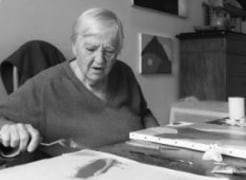
Opening reception: Thursday, June 28, 6-8pm
Galerie Lelong & Co. is pleased to present Of the Self and of the Other, the first exhibition to bring together the works of Etel Adnan, Ione Saldanha, and Carolee Schneemann, featuring a selection of historical and recent paintings, sculptures, and works on paper. Of the Self and of the Other is titled after one of Adnan’s poems, “There: In the Light and in the Darkness of the Self and of the Other” (1997). Contemplating the encounters between two entities which may influence and be influenced by the self and the other, the exhibition considers how these three artists focused on the relationship between body and landscape.
The career of Lebanese-born Etel Adnan (b. 1925) spans several decades, encompassing a wide range of traditions, locations, and media, including painting, drawing, tapestry, film, ceramics, and prints. Renowned for her poetry and prose before also gaining international recognition for her visual art, Adnan’s early pastels and recent paintings on view are inspired by the landscape, which has remained at the core of her artistic production. Employing color and light through abstract and quasi-abstract compositions, Adnan’s paintings transport the viewer to specific moments of a day in a given season. Her recent works reflect inner landscapes which combine vivid memories with a freedom to be more imaginative. One of Adnan’s leporellos, or Japanese folding artist books, in which the artist often merges her visual and written vocabularies, will also be on view. The artist is the subject of four solo exhibitions this year, including Etel Adnan: A yellow sun A green sun a yellow sun A red sun a blue sun, on view now at MASS MoCA.
Ione Saldanha (1921 – 2001) was a painter engaged in geometric abstraction whose body of work remains relatively unknown outside her native Brazil. On view will be a group of flatly painted abstractions in oil and gouache from the early to mid-1960s. Composed of stacked and overlapping geometric shapes that evoke a strong sense of movement, these paintings evolved from Saldanha’s early representational depictions of colonial towns.
In the late 1960s, while seeking freedom from the confines of the vertical wall and rectangular canvas, Saldanha created her first ripas—long, narrow slats of wood painted in vibrant colors inspired by her natural surroundings—which she gently leaned side-by-side against her studio wall. Along with four ripas, the exhibition also features an elegantly poised, painted bamboo; the rings of color recall ritual instruments used by Afro-Brazilian tribes. The exhibition includes other significant works that outline the expansion of Saldanha’s painting into three dimensions: Bobina, consisting of a painted spool, and Empilhado, a construction of painted and stacked wooden blocks. The artist’s most recent solo exhibition, Ione Salndaha: O Tempo E A Cor, was curated by Luiz Camillo Osorio and presented at the Fundação Iberê Camargo, Porto Alegre (2012); Museum of Modern Art, Rio de Janeiro (2013); and Museu Oscar Niemeyer, Curitiba (2013).
A pioneer of feminist performance art, Carolee Schneemann (b. 1939) began her career as a painter, a medium which the multidisciplinary artist continues to incorporate in her photographs, film, mixed media, and installations. The earliest traces of Schneemann’s kinetic painting can be seen in her landscape paintings from the mid-1950s to the early 1960s. Winter Fuel’s I (1956), Winter’s Fuel II (1959), and Early Landscape (1959) demonstrate a desire to, in the artist’s words, “bring the canvas to life with dynamic brushwork, investing it with both substance and motion.” These practices eventually transferred beyond the canvas and onto painting constructions consisting of painted assemblages and boxes, which in some cases incorporate the element of chance through the use of fire in the creative process. Prior to their inclusion in the retrospective Carolee Schneemann: Kinetic Painting—organized by the Museum der Moderne Salzburg (2015) and most recently exhibited at MoMA PS1, New York (2017)—these paintings, which play a crucial role in her oeuvre, had rarely been seen.